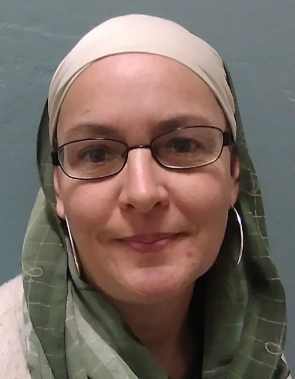
“Shrinking” Injustice: Muslim Mental Health Professionals’ Role in Social Activism
By: Sarah Huxtable Mohr
“As Muslim mental health practitioners, we are engaging in the jihad of speaking truth to power every day with our praxis.”
A hadith of the Prophet (peace be upon him) states that when asked “What is the best jihad?” he responded “A word of truth in front of a tyrannical ruler (1).” Speaking truth in its deepest sense goes far beyond mere conversation or speech. Speaking truth is about genuine engagement with the world to work toward transformation and renewal. According to Paolo Freire in Pedagogy of the Oppressed, true words require both reflection and action to truly transform the world (2). As Muslim mental health practitioners, we are engaging in the jihad of speaking truth to power every day with our praxis. We make known the benefits of being a practicing Muslim through research, community wellness, and consciousness raising. We observe the religious responsibilities of Islam and live a spiritual life based on Islam. These reflections and actions are the greatest jihad of speaking truth to power.
There is media attention to the negative portrayals and behaviors of Muslims such as domestic violence, terrorism, and all sorts of fanaticism. Islam is often deemed as a religion of terrorism (3), including an orientation to time that is incompatible with Western civilization (4, 5). Repeatedly thinkers have argued that Islam conflicts with contemporary ideas such as democracy, the values of the enlightenment, and modern and peaceful civilization. Interestingly, these ideas are somehow associated, in a bizarre reversal, with the West. On the one hand, Muslims are depicted as violent and destructive by the U.S. media. Simultaneously, the U.S. is responsible for 34% of total arms sales internationally, the sale of weapons to 98 nations in the last 4 years, and the largest arms deals on earth (6). This contradiction remains unresolved.
“The individuals we are counseling already have the wisdom and tools with which to self-actualize and realize high levels of mental wellness.”
Significant evidence exists supporting that religion generally, and Islam specifically, can have a strong positive impact on individuals’ mental health (7; 8). Religiosity among Muslims has been linked to lower rates of alcohol abuse (9), lower rates of suicide (10), better body image among women, particularly women who wear the headscarf (11), and a host of other positive mental and physical health outcomes (12). Studies show there may be mental health benefits to individuals practicing Islam including prohibitions in the religion against self-harming behaviors, increased social support, increased self-esteem, and a variety of other positive messages and values that practicing Muslims draw from the faith (7, 12). However, it is important to consider that these aspects of theology and community life can have varying impacts on different individuals. We, as mental health practitioners, who believe in and espouse positive benefits of Islam, through the structure of practice, and the beneficial aspects of belief, are speaking in resistance to many mainstream voices in the United States and basing our claims on proven science.
There is an internal orientation within the professional mental health community to bring consciousness of mental health issues to the Muslim community. It is important to keep in mind that during this work there is always a danger of thinking that as mental health professionals, we have somehow gained knowledge of how to live and be well which is exclusive – that we can begin to feed to the passive gasping masses. This is utterly antithetical to the liberating project of creating a Muslim community that embraces and embodies wellness. The individuals we are counseling already have the wisdom and tools with which to self-actualize and realize high levels of mental wellness. As mental health practitioners, in the Rogerian sense, we need only make the space for our community to realize its fundamental wellbeing.
“Understanding the Islamic heritage and working for Muslim wellness from within its own tradition, not solely from Eurocentric models, is a critical part of this jihad.”
In the current climate of Islamophobia, we must be mindful to come from a strength-based perspective about our community and our faith (7). A strength-based perspective means focusing on positive protective factors, successful behaviors and choices, and building on what is working well for individuals and for the community as a whole. We have to be strength-based in our approach to our tradition in terms of our mental health interventions as well. It is essential in the process of working to liberate individuals from tyranny that we do not reproduce oppressive structures. We must confront what does not liberate us within our own community and society. Ignacio Martin-Baro wrote about the importance of protest, revolution, and social justice as he developed his Liberation Psychology. He said that, through practicing psychology, we need to consider the societal structures which produce dysfunction through limiting human possibility. He writes, “If it is not the calling of psychologists to intervene in the socioeconomic mechanisms that cement the structures of injustice, it is within the psychologist’s purview to intervene in the subjective processes that sustain those structures and make them viable (13).” While I do not agree with Martin-Baro that it is not our job to intervene in structural injustice (I am a social worker, he was a psychologist), I do believe it is essential that we come from a positive approach. It is imperative that we focus on solutions and successes rather than focusing on our problems.
Being strength-based with Muslims in our approach, as with other marginalized communities, is even more essential due to the severe oppression these individuals experience as a community.. Martin-Baro and Freire both talk about the importance of not attempting to liberate people using interventions that involve “theoretical assumptions made from a position of power (13).” In one sense, this can involve working from Islamic assumptions. This work has begun with approaches like Traditional Islamically Integrated Psychotherapy (TIIP) and Dr. Robert Frager’s Transpersonal Psychology (14). Additionally, individuals like Awaad and Ali (15,16) bring to light pre-modern thinkers like Al Balkhi and early Muslim advances in science, medicine, and mental health to the forefront. Understanding the Islamic heritage and working for Muslim wellness from within its own tradition, not solely from Eurocentric models, is a critical part of this jihad. This does not mean to reject prominent thinkers per se, but to see whether their work is compatible with what constitutes a healthy life in Islamic scriptural, spiritual, and ethical traditions (17). This allows for an opportunity to rethink traditional European psychology in terms of Muslim beliefs and worldview (18,19).
The first hadith of Imam Nawawi’s famous collection of Hadith states, “Verily, deeds are only with intentions. Verily, every person will have only what they intended (1).” With this in mind, we as Muslim mental health practitioners, should make among our intentions that our work in mental health is a struggle for justice, the best jihad. In doing so, we can reap the greatest benefit in this life and the next.
References:
Freire, Paolo. (2001.) Pedagogy of the Oppressed: 30th Anniversary Edition. New York: Continuum.Abdullah, S. (2014). An Islamic Perspective for Strengths-Based Social Work with Muslim Clients. Journal of Social Work Practice, 29(2), 1-10.
Falk, Avner. (2008) Islamic Terror: Conscious and Unconscious Motives. Westwood, Connecticut: Praeger Security International.
Khalaf, Sattam. (2014). Socio-anthropological interpretation of time and pathology of time in Arab-Muslim society. Forum on Public Policy: A Journal of the Oxford Round Table, Forum on Public Policy: A Journal of the Oxford Round Table, 2014.
Harris, L. (2007). The suicide of reason: Radical Islam’s threat to the enlightenment. New York: Basic Books.
Brown, D. (2018.) Weapons sales are on the rise- here are the top ten countries exporting arms around the world. Business Insider. Retrieved from: https://www.businessinsider.com/top-countries-exporting-weapons-arms-sales-2018-3#1-united-states-10
Mohr, S. (2017). Protective factors in Muslim women’s mental health in the San Francisco Bay Area. California State University, East Bay thesis.
Hodge, D., Zidan, T., & Husain, A. (2016). Depression among Muslims in the United States: Examining the Role of Discrimination and Spirituality as Risk and Protective Factors. Social Work, 61(1), 45-52.
Abu-Ras, W., Ahmed, S., & Arfken, C. (2010). Alcohol Use Among U.S. Muslim College Students: Risk and Protective Factors. Journal of Ethnicity in Substance Abuse, 9(3), 206-220.
Gearing, R., & Alonzo, D. (2018). Religion and Suicide: New Findings. Journal of Religion and Health, 1-22.
Dunkel,T., Davidson, D., & Qurashi, S. (2010). Body satisfaction and pressure to be thin in younger and older Muslim and non-Muslim women: The role of Western and non-Western dress preferences. Body Image, 7(1), 56-65.
Koenig, H. G., & Shohaib, S. A. (2014). Health and well-being in Islamic societies: Background, research, and applications. New York, NY: Springer.
Martin-Baro, Ignacio. (1994.) Writings for a liberation psychology. Eds, Aron, A and Corne, S. Cambridge, Massachusetts: Harvard University Press.
Bektasoglu, A. & Ulusoy, V. (2010.) Robert Frager on psychology from the viewpoint of Sufism. World Bulletin. Retrieved from: https://www.worldbulletin.net/interviews-in-depth/robert-frager-on-psychology-from-viewpoint-of-sufism-h62034.html
Awaad, R., & Ali, S. (2015). Obsessional disorders in Al-Balkhi′s 9th century treatise: Sustenance of the body and soul. Journal of Affective Disorders, 180, 185-189. Retrieved from: http://dx.doi.org.proxylib.csueastbay.edu/10.1016/j.jad.2015.03.003
Awaad, R., & Ali, S. (2016). A modern conceptualization of phobia in Al-Balkhi’s 9th century treatise: Sustenance of the body and soul. Journal of Anxiety Disorders, 37, 89-93.
Haque, A., Khan, F., Keshavarzi, H., & Rothman, A.E. (2016) Integrating Islamic Traditions in Modern Psychology: Research Trends in Last Ten Years. Journal of Muslim Mental Health. 10(1) Retrieved from: http://dx.doi.org/10.3998/jmmh.10381607.0010.107
Haque, A. & Keshavarzi, H. (2014.) Integrating indigenous healing methods in therapy: Muslim beliefs and practices, International Journal of Culture and Mental Health, 7:3, 297-314, DOI: 10.1080/17542863.2013.794249
Haque, A. & Keshavarzi, H. (2013.) Outlining a Psychotherapy Model for Enhancing Muslim Mental Health Within an Islamic Context. The International Journal for the Psychology of Religion, 23:230–249. DOI: 10.1080/10508619.2012.712000
About The Author:

Sarah Mohr is an Associate Clinical Social Worker and Certified Drug and Alcohol counselor who works in the SF Bay Area as a case manager for at-risk youth. She focuses in her work on positive psychology, with a client-centered, strength-based orientation, building on and supporting wellness and empowerment in individuals and communities.
